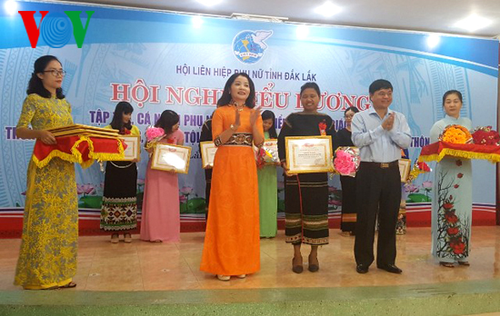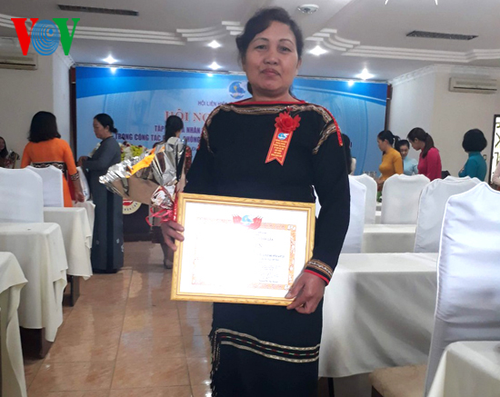 Outstanding women in Dak Lak are praised at a ceremony. Outstanding women in Dak Lak are praised at a ceremony. |
The Central Highlands province of Dak Lak is home to 49 ethnic minority groups. Sek hamlet in Ea H’leo district used to be a hotspot for traffic accidents on the section of National Highway 14 that runs through the province. The problem stemmed from local teenagers getting together to drink, disrupt public order, and drive too fast for safety. In the early 2000s, Sek hamlet was also a hotspot for illegal border crossings.
But since women got actively involved in maintaining public order and security, Sek hamlet has become less of a problem spot.
 Kpa H’Ben is one of ethnic minority women in Dak Lak to have contributed to keeping her Sek hamlet peaceful. Kpa H’Ben is one of ethnic minority women in Dak Lak to have contributed to keeping her Sek hamlet peaceful. |
Kpa H’Ben, Secretary of Sek hamlet’s Party cell, said the women’s associations have done a good job of persuading villagers not to break the law.
“Thanks to the women’s associations, social evils in the hamlet have been significantly reduced. Illegal border crossings are no longer occurring. We no longer see drug addiction and traffic accidents have greatly decreased,” said Kpa H’Ben.
Cu Dlie Mnong commune in Cu Mga district, has been turned into a new-style rural village thanks to the cooperative efforts of local women.
The 6 women’s associations of Cu Dlie Mnong have gotten local young people to stop gathering to drink and disrupt public order, 16 women have been moved to community houses to protect them from domestic violence, 18 bickering couples have been reunited through mediation, and information has been provided to the police that have helped them arrest law breakers.
H’Yuor Kdoh, Chairwoman of the Cu Dlie Mnong communal Women’s Union, said: “An association that encourages women to be healthy and beautiful has attracted the most members. Though it was only established last year, it already has members ranging in age from school pupils to the elderly which makes it easier to widely disseminate messages aimed at crime prevention and hamlet security.”
Three years ago, hamlet 6A in Ea H’leo district was a hotspot for drugs. A campaign launched by the local women's union has made people more aware of the harmful effects of drugs and persuaded them not to abuse or traffick drugs. The campaign has heightened people’s sense of their responsibility to notice and denounce criminal behavior.
Nong Thi Hue, a native of hamlet 6A, said that over the past two years, drug use has disappeared from the hamlet.
“The women’s union members set an example for others to follow. They make each other more aware of the importance of drug prevention, then advise and teach their children. None of the 70 members of the union have drug addicted children,” Hue added.
Nguyen Thi Thu Nguyet, Chairwoman of the provincial Women's Union, said top priority is given to helping ethnic women improve their financial condition and stabilize their lives so they will abide by the law and feel comfortable participating in community activities.
She said 945 women in Dak Lak, half of them ethnic women, have earned official praise for their public contributions.
“One of our breakthroughs has been setting up clubs which organize activies for ethnic women and men to raise their awareness of, and eradicate, backward customs, while retaining the best features of the cultural identity of each locality," said Nguyet.